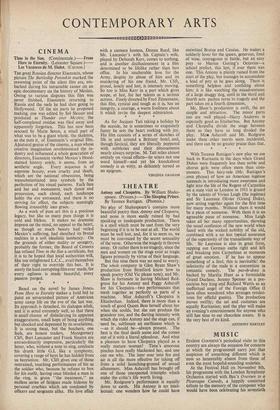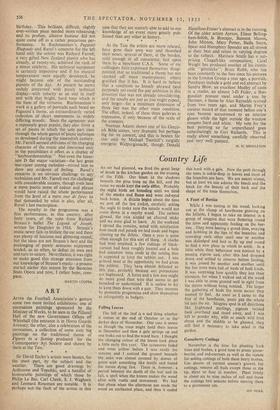MUSIC
EUGENE GOOSSENS'S periodical visits to this country are always the occasion for concerts at which the programmes carry just that suspicion of something different which is now so lamentably -absent from those of even the most hopeful-sounding societies.
At the Festival Hall on November 8th, his programme with the London Symphony Orchestra started with Bax's Overture to a Picaresque Comedy, a happily conceived tribute to the memory of the composer who would have been celebrating his seventieth birthday. • This brilliant, difficult, slightly over-written piece needed more rehearsing, and its profuse, allusive humour did not quite come off in a rather precarious per- formance. In Rachmaninov's Paganini Rhapsody and Ravel's concerto for the left hand only the soloist was Richard Farrell, a very gifted New Zealand pianist who has already, at twenty-six, achieved the rank of a minor celebrity. His technical equipment is certainly impressive and if his musical temperament were equally developed, he might become one of the outstanding pianists of the day. At present he seems unduly concerned with purely technical display—with velocity as an end in itself and with that bright, hard tone which is the bane of the virtuoso. Rachmaninov's work is a gallery of portraits each based on Paganini's theme, an extraordinarily varied collection of short movements in widely differing moods. Since the composer was a supremely great pianist, they also form a set of pieces in which the solo part runs through the whole gamut ofpiano technique as developed during the ninetethnh century. Mr. Farrell seemed oblivious of the changing character of the music and interested only in the possibilities it offers as a display of "keyboardsmanship." Not even the luxur- iant D flat major variation—the last great tear-raiser among melodies—stirred him to show any evidence of feeling. Ravel's concerto is an obvious challenge to any technician and Mr. Farrell met the challenge with considerable success, though even here a more poetic sense of colour and phrase would have raised the whole performance from the level of a mere tour de force to that demanded by what is also, after all, Ravel's last masterpiece.
The novelty in the programme was a first performance, in this country, after forty years, of the suite from Richard Strauss's ballet The Legend of Joseph, written for Diaghilev in 1914. Strauss's music never fails to titillate the ear and there was plenty of luscious and glittering sound; but the ideas are not Strauss's best and the prolonging of purely sensuous enjoyment tended, as so often, to defeat its own end and turn to satiety. Nevertheless, it was right to make good this strange omission from our knowledge of Strauss's music—a process started earlier this season by the Bavarian State Opera and now, I rather hope, com- plete.
MARTIN COOPER

































 Previous page
Previous page